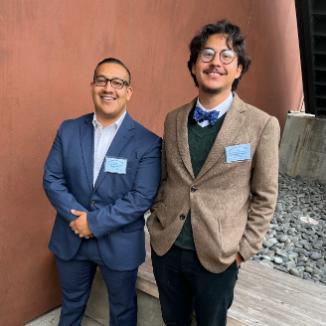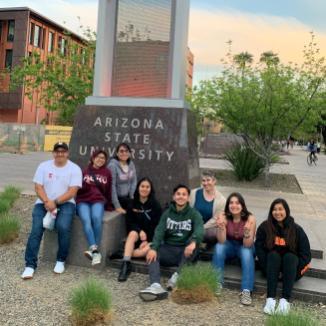McNair Scholars Program
The McNair Scholars Program is embedded within the UROC Scholars program and prepares academically-talented and motivated CSUMB undergraduates from all majors for doctoral level studies via engagement in research and other scholarly activities that support the successful transition to graduate programs.
The McNair Scholars Program is supported by the Department of Education and established in memory of Dr. Ronald E. McNair, a physicist and NASA astronaut who served on the Challenger space shuttle.
The McNair Program is for students who:
- Enjoy being part of a student cohort striving for graduate degrees.
- Strive for intensive research experiences.
- Dedicate themselves to scholarship, leadership, and high-achievement.
- Commit to pursuing a Ph.D. in a research-focused graduate program.
Learn more about the McNair experience in the Stories of Dos Mujeres McNair at CSUMB podcast.

Students prepare for the 2023 Summer Research Symposium.

McNair Scholars visit Arizona State University to learn more about graduate school.
-326x326.jpg)
Student conducts summer research at the University of Minnesota.
Benefits
- Discipline-specific faculty mentoring
- Comprehensive research seminar
- $2800 annual research scholarship
- National recognition
- Graduate school preparation and funding advisement
- GRE fee reduction waivers and GRE preparation workshops including study materials
- Travel support to present research at nationally recognized research conferences
- Supportive network of McNair Scholars
- Graduate programs/schools visits
- Opportunity to publish in peer-reviewed journals
- Participation in cultural events and social gatherings
Eligibility
- Strong academic records (recommended minimum 3.0 cumulative GPA)
- U.S. citizenship or U.S. permanent residency
- Be either a first-generation & federally low-income college student or belong to a group traditionally underrepresented in higher education

Applications open during the fall semester of the school year. Learn more about what the application requires.
Who was Ronald McNair?
Dr. Ronald Erwin McNair was an American NASA astronaut and physicist who died during the launch of the Space Shuttle Challenger on January 28, 1986. Growing up in a low-income community in South Carolina, McNair overcame obstacle after obstacle ultimately being selected as one of 35 new astronauts from 8,000 applicants in 1978. He was also one of just three African Americans selected, which included Col. Guion Bluford, the first African American to travel in space. McNair would become the second African American to fly in space in 1984. McNair was also an accomplished saxophonist and even played while in space.
Following his death, members of Congress provided funding to create the Ronald E. McNair Scholars Program. It is intended to encourage students who come from low-income, first-generation college backgrounds, or are members of a group that is traditionally underrepresented in graduate education to pursue doctoral level students through involvement in research and other scholarly activity.